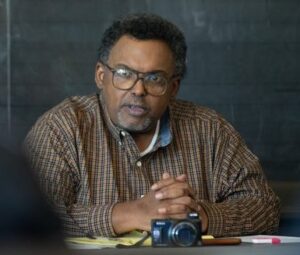au naturel
Scientists have rarely played such a pivotal and public role in society, and certainly never before in the digital age. But the centrality of science is about much more than the pandemic. Today’s Daily Dose explores scientists who do more than just keep us alive, from the climatologist who could become a president to researchers rectifying racial disparities and discovering the tunes that make sharks shout “That’s my jam!” OK, so sharks don’t really shout; they communicate with body language. We know this because, well, science.
Catarina Vila Pouca
This Portuguese scientist doesn’t just watch Shark Week; she lives it. Fascinated by the cartilaginous sea critters since childhood, she uses guppies from Trinidad to study how life as a predator can engineer the evolution of cognitive abilities more often associated with humanity — things like learning, remembering and problem-solving. It’s the latest turn in a career that’s “taken me to different waters,” as she writes from a lab in the Netherlands, including studying blue sharks off the North Atlantic and “charismatic” Port Jackson sharks in Australia. It was in the latter locale that she decoded their musical tastes: Sharks like jazz, it turns out, after associating it with food, but are confused by classical music. Honestly, same.

Segenet Kelemu
You know you’re doing something right when Bill Gates calls you one of his heroes. After watching a near-biblical swarm of locusts destroy the crops in her Ethiopian village, Kelemu turned to science and changed the world. First as the first woman from her region to get a college degree, which she earned from Addis Ababa University, then, while studying plant pathology and genetics at Montana State, Kansas State and Cornell University in the U.S. She returned to Africa in 2007, determined to keep farmers from devastating losses by better understanding the symbiotic relationship between plants and insects. The 63-year-old now leads the International Centre of Insect Physiology and Ecology in Nairobi, which is at the forefront of global efforts to defeat food insecurity.
Kári Stefánsson
The Icelandic researcher, 71, unraveled one of my childhood’s biggest mysteries — why my mom and sisters always insisted I needed another dab of deodorant when I thought I smelled perfectly fine. My personal hygiene problems aside, the question is also one of humanity’s oldest questions, with scientists long wondering why some people don’t smell body odors that most everybody else can. Turns out, there is a gene that helps people pick up certain smells, such as identifying when something is fishy. Stefánsson, a former Harvard professor, founded the Reykjavik-based deCODE Genetics in 1996, where he and his team have identified the genetic risk factors for dozens of ailments, from cardiovascular disease to cancer.
The Columbia University environmental sciences professor is taking on the entire oceanic food chain by starting with its smallest link — the microbe. While the talk about food and climate change focuses on the visible world consumed by humans (meat, grains, etc.), she is showing how unseen organisms could have huge ramifications for our survival. And Dyhrman, 48, combines that microscopic gaze with an awareness of the bigger picture, developing ocean science literacy activities for physical classrooms and the virtual educational site Whyville that have exposed more than 1 million children to the scientific process.
‘political’ scientists
Claudia Sheinbaum Pardo
Sheinbaum was born to a family of scientists: a chemical engineer father, a biologist mother and a brother who became a physicist. And still, Sheinbaum, 58, has likely exceeded the wildest expectations of her brainy childhood dinner table. In 2006, the environmental engineer received the Nobel Peace Prize alongside Al Gore as a key part of the Intergovernmental Panel on Climate Change. And the scientist, whose mother’s family fled Europe during the Holocaust, is now the mayor of Mexico City. A close ally and former environmental minister to President Andrés Manuel López Obrador, Sheinbaum could one day become Mexico’s first female president.
Salim Abdool Karim
The South African epidemiologist, 60, has outlasted his critics. He was once branded a traitor by a health minister under Thabo Mbeki after criticizing the president’s anti-science comments on HIV/AIDS. Two decades and three presidents later, Karim was asked to lead South Africa’s health response to COVID-19. Despite its being one of the worst-hit countries on the African continent, Karim remains popular and in December won the John Maddox Prize for the defense of science, alongside Dr. Anthony Fauci. Karim and his wife (and research partner) also won a 2020 global health award for a discovery crucial to HIV prevention efforts that is leading to infection reductions across Africa and the world.

Politics, like the universe, is relative. That’s the belief of Sarkissian, the physicist-turned-president of Armenia who uses quantum physics as a helpful guide to the turbulent geopolitics his nation faces. “The world is changing, rapidly,” he told Russia Today in 2019. “And [all] politicians will come and go.” Sarkissian, 67, wasn’t always so serious: Also a computer scientist, he helped design the popular ’90s Tetris spinoff Wordtris. But his nod to mortality may be the result of his country standing on the brink of a war that, he warned the international community, could turn Armenia’s Caucasus region into “another Syria.” With his country also facing a domestic crisis, Sarkissian is counting on the administration of U.S. President Joe Biden — perceived as friendly to the Armenian cause — to boost international solidarity efforts.
Melanie Stansbury
The New Mexico state representative is a former ecology educator and White House and Senate aide who became the first 2022 federal candidate endorsed by 314 Action, a group that backs candidates with scientific backgrounds and spent $25 million in the 2020 elections. Stansbury, 42, a Democrat, is running to replace Rep. Deb Haaland, expected to be confirmed as President Biden’s secretary of the interior. She has helped shepherd more than a dozen bills into law during her first term in Santa Fe, including efforts to modernize the electricity grid and better manage the state’s water, so look for her to bring an environmental eye to Washington, if she makes it through.

keeping you kicking
Susana López Charretón
This Mexican virologist wants to save you some baby wipes. A leading researcher into rotaviruses — the double-stranded RNA viruses that are the leading cause of diarrhea in children under 5 around the globe — Charretón, 63, and her team identified the mechanism by which they reproduce in the small intestine, leading to explosive results.
Jingmei Li
“Research is a lot like diving,” says Li, 37, who does some of her best thinking strapped to an oxygen tank beneath the sea. Both disciplines are about searching for things hiding in plain sight, something she often does while sifting through reams of information to identify the risk factors shared by women with breast cancer. While much progress has been made through discoveries of gene-related predictors and examining lifestyle factors like obesity, Li takes the groundbreaking additional step of examining breast density through mammograms. Now based at the Genome Institute of Singapore, Li is becoming a global leader on the most common cancer for women worldwide.
Yakeel Quiroz
I began writing in part because I feared what I will one day forget. Thankfully, this Harvard scientist and others are working to ease that fear in the future. Quiroz was part of a global team last year that created a blood test that could possibly enable doctors to forecast Alzheimer’s disease a full two decades before symptoms appear, a critical discovery that could aid in slowing and curbing the disease’s debilitating effects. The Medellín native benefited from going back to her roots, beginning her research with a rural Colombia clan where nearly half the population develops the brain disorder by their mid-40s.
Xiaoliang Sunney Xie
For now, peers call the Beijing-born scientist a “founding father” of single-molecule biophysical chemistry. But he could soon be helping fathers worldwide. The 58-year-old Peking University professor pioneered genetic innovations that have made in vitro fertilization safer by helping doctors identify traits that could lead to the transmission of genetic disorders in newborns. But as with so much of cutting-edge biomedical science, Xie’s work could also give way to controversial applications. Some fret that prenatal gene identification will lead to discriminatory abortions (in the United States, the termination rate for those with the Down syndrome gene is around 67 percent; in Iceland and Denmark, it’s nearly 100 percent). Regardless, Xie’s discoveries are crucial to understanding why some are born with such afflictions — and without them, the chances of creating preventative cures is slim.

Gagandeep Kang
What does it take to earn the nickname “vaccine godmother” of India? It helps to start work early: Kang built her first home lab at just 12 years old (her experiments making hydrogen nearly blew off their roof). The first female Indian scientist to be elected a fellow of the Royal Society of London, Kang, 58, is also a board member of one of the key groups administering the World Health Organization’s global coronavirus vaccine project, COVAX, which has committed to equitable distribution. Co-authoring a new book in India, Kang is among the most prominent experts battling COVID-19 vaccine misinformation in the world’s second-most populous nation — which is to say, there is no post-pandemic world without India getting on board.
Kizzmekia Corbett
One of few African American women scientists at the National Institutes of Health, Corbett, 35, was a critical part of Fauci’s team that worked with Moderna to bring its novel COVID-19 vaccine to fruition. The North Carolina native also was unafraid to call out then-President Donald Trump for a lack of diversity among the scientists on his coronavirus task force.
changing the norm
Omololu Akin-Ojo
The Nigeria native wants to stem the African brain drain. As founding director of a new research institute in Rwanda, he’s on a mission to rebrand East Africa as a hub for quantum physics. As a university student in Nigeria in the late ’90s, he learned how to code by hand — writing computer scripts on paper because he didn’t have access to a computer. Despite dearly wanting to stay in Africa, those limitations caused him to travel to the University of Delaware to continue his studies in the U.S. His efforts will be boosted by the Rwanda government’s goals to raise the percentage of students in STEM fields by 90 percent in the next decade.

Abasi Ene-Obong
People of Caucasian descent constitute less than 15 percent of the world’s population, yet they make up 78 percent of human subjects in genome research. That skews drug research. Ene-Obong, 35, is trying to fix that. His startup, 54gene, named after Africa’s 54 countries, is building a pan-continental bank of African genes to support research that the West has long ignored. It doesn’t hurt that Ene-Obong, who is from Nigeria, also has a master’s degree in business and management, helping him secure $15 million from a fund backed by the Bill & Melinda Gates Foundation to bankroll his gene bank dream.

Ranga Dias
Let’s just say he’s good under pressure. The Sri Lankan physicist led a team at the University of Rochester in developing the world’s first room-temperature superconductor — electrical current-carrying substances used in everything from the magnets that power MRIs to particle accelerators. Of course, doing so required an environment roughly equivalent to 2.6 million times the Earth’s atmospheric pressure at sea level. Still, Dias and his colleagues believe their findings can be recreated in let’s just say “slightly” less high-pressure situations, particularly if they can change the chemistry of their shocking invention. If successful, their carbonaceous semiconductor could greatly improve energy transfer efficiency, giving everyone a jolt.




